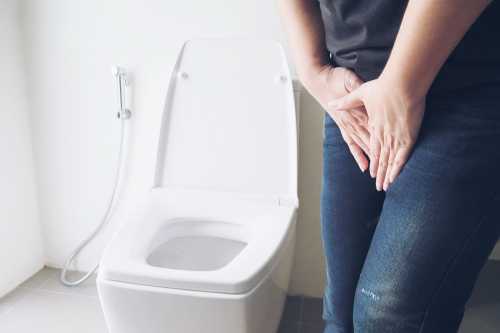Do you have pains in your lower back and do you also have blood in your stool? Are you wondering if these two are related? Then you have come to the right place.
Lower back pains and blood in stool are related. However, they are caused by a variety of reasons. There is no specific cause of having both lower back pains and blood in your stool. Blood in your stool can be caused by bowel disorder, bowel cancer, constipation, inflammation of the rectum, rectal ulcer, amongst others.
So, to determine the exact reason why you might have lower back pain and blood in your stool, we first need to take a look at certain factors and diseases that can cause this.
What causes lower back pain and blood in stool
Lower back pain and blood in stool are caused by a host of reasons or conditions some of which include:
- Appendicitis
- Annal fissure
- Bowel Obstruction
- Endometriosis
- Rectal Ulcer
- Urinary Tract Infections
- Haemorrhoids
- Diverticulosis
- Disorder of the liver
Let us, therefore, take each of these conditions and find out how they are able to cause both lower back pain and blood in the stool.
Appendicitis
The inflammation of the appendix is what we refer to as appendicitis. The appendix is a small organ that extends from the first part of the colon to your lower right abdomen.
The appendix of some people even extends behind the colon which can cause lower back pain. This is a condition that requires immediate medical attention.
Other symptoms of appendicitis include;
- diarrhoea
- constipation
- loss of appetite
- abdominal pain
- inability to release gas, etc.
A ruptured appendix can spread infection through your abdominal cavity and is life-threatening. Consult a medical doctor or health professional if you exhibit any signs of appendicitis.
The primary site of pain in appendicitis is the lower right abdomen but usually begins from the navel area and moves downwards. Occasionally, it may also present with back pain and bloody stools. The lower back pain may be experienced because the pain from the lower right abdomen may also radiate to the right back.
There has been a case report of bloody diarrhea associated with appendicitis which was traced to granulomatous appendicitis and was successfully treated. (source)
Anal fissure
This is a tear in the lining of the last part of the rectum. A common cause of anal fissure is constipation. Lower back pain and stool which has blood can be caused by an anal fissure.
Some signs of an anal fissure include; pain in the anus that worsens during defecation, pain around the buttocks, the upper part of the thighs, and the lower back.
Since anal fissure is basically a tear in the anus, it is common to find blood in stools. Hence, you can have lower back pain and blood in stools if you have some anal fissures.
Check this post out to learn about natural remedies for constipation in other to prevent anal fissures.
Bowel obstruction
A bowel obstruction is a gastrointestinal condition in which digested substances cannot pass normally or as they should through the bowel.
A bowel obstruction can be caused by fibrous tissue that compresses the gut, which can develop many years after abdominal surgery. When there is a bowel obstruction, the blockage in your colon or rectum can create pain that extends from the abdomen to the lower back.
Straining during defecation in the presence of bowel obstruction may result in lower back pain and blood in the stool.
Endometriosis
It is a condition in which the tissues responsible for lining the uterus, grow outside the uterus. The tissues that should be lining the uterus can be found on the ovaries, fallopian tubes, or the intestines in people with endometriosis.
Bowel symptoms are also very common with endometriosis and back pain is one of these symptoms. This is because endometrial cells can stick to the lower back and the front of the pelvic cavities.
When these cells implant in the rectum (Bowel endometriosis), it can easily result in gastrointestinal bleeding hence you are likely to have lower back pain and blood in the stool.
Rectal ulcer
This is a condition in which a painful sore develops inside your rectum. A rectal ulcer is usually caused by constipation, solitary rectal ulcer syndrome.
When this condition occurs, the pain from your rectum can move to your lower back. Also, you can experience severe pain when it comes to powerful bowel movements. Bloody stool is also a sign of a rectal ulcer.
Urinary tract infections
Infections that affect any part of the urinary system of the human body is what we call urinary tract infection (UTI). The common sign of a UTI is the strong urge to urinate.
Urinating comes along with a burning sensation and the urine has a cloudy nature. UTIs also cause bowel problems which can lead to blood in your stool.
They can also cause serious pain around the lower part of your back as the infection reaches your kidneys. Feeling pain in the lower part of your back is very common when it comes to UTI.
Haemorrhoids
Another cause of lower back pain and blood in the stool is haemorrhoids. Haemorrhoids are swollen veins in your lower rectum and anus which causes discomfort and bleeding.
Straining during bowel movements can also cause haemorrhoids and swollen haemorrhoids can lead to lower back pain.
Diverticular disease (Diverticulosis)
Diverticulosis happens when small, bulging pouches (diverticula) develop in your digestive tract. When one or more of these pouches become inflamed or infected, the condition is called diverticulitis.
The diverticula can also bulge in the walls of your rectum leading to the formation of abscess which leads to abdominal pain and blood in the stool.
Lower left abdominal pain is a common cause of diverticulitis. Blood, mucous, or pus found in the stool is also another cause of diverticular disease.
Disorder of the liver
A liver disorder is caused by a wide variety of conditions that damage the liver making it unable to function properly. Common liver disorders include cancer, cirrhosis, and hepatitis.
When the liver happens to swell up, it can press on the nerves in the lower back which results in the person feeling pain. Liver problems are also known to cause problems for regular bowel movements.
Common liver disorders are cancer, cirrhosis, and hepatitis. Blood in the stool is also another problem of bowel movement caused by liver problems. Bleeding tendencies are increased in the presence of severe liver damage and hence blood in stools may be a common occurrence in such cases.
Are there any treatments for lower back pains and blood in the stool?
Lower back pain and blood in the stool have many medical and home remedy treatments. However, the treatment will differ depending on the cause.
It is also recommended that you talk to a doctor or health professional if you have lower back problems and have blood in your stool.
Some medical treatment for lower back pains and blood in the stool can be found below
- Antibiotics
- Muscle relaxers
- Antidiarrheal medication
- Electrolyte replacement
- Biofeedback
- Surgery
- Anticancer drugs
- IV fluids.
Home remedies for lower back pain and blood in stool
If you cannot afford to go to the hospital or see a doctor, you can try out some of these home remedies to help alleviate your pain. It is however still recommended that you go see a doctor if the pain and bloody stool persist.
- Heat and cold therapy. Using cold therapy first reduces inflammation and swelling. Then apply heat therapy to soothe and relax aching muscles and enhance blood flow for healing to progress.
- Exercise regularly: Exercise helps build strong, flexible muscles that will be less prone to injury. It can also help the healing process for an aching back, prevent problems in the future, and improve function.
- Complementary therapy : bone manipulation by chiropractors, acupuncture and movement therapies including ti chi, yoga among others can help strengthen back muscles.
- Drinking adequate fluid daily also facilitates with circulation and healing.








1 Comment